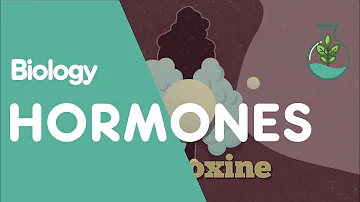What do hormones do simple definition?
Table des matières
- What do hormones do simple definition?
- What is hormone and its function?
- Where are hormones in the body?
- What are the 4 types of hormones?
- What do hormones do to a woman?
- How do hormones work in a woman?
- Are hormones good or bad?
- What are the 7 hormones?
- What are the 3 main hormones?
- What hormones cause jealousy?
- What are five functions of hormones?
- What are hormones classified as?
- What do hormones do exactly?
- What are the functions of hormones?

What do hormones do simple definition?
Hormones are chemical substances that act like messenger molecules in the body. After being made in one part of the body, they travel to other parts of the body where they help control how cells and organs do their work. For example, insulin is a hormone that's made by the beta cells in the pancreas.
What is hormone and its function?
Hormones are chemicals that coordinate different functions in your body by carrying messages through your blood to your organs, skin, muscles and other tissues. These signals tell your body what to do and when to do it.
Where are hormones in the body?
Hormones and the Endocrine System
| Where the hormone is produced | Hormone(s) secreted |
|---|---|
| Ovaries | Progesterone |
| Parathyroid glands | Parathyroid hormone (PTH) |
| Thyroid gland | Thyroid hormone |
| Adrenal glands | Epinephrine |
What are the 4 types of hormones?
Summary
- libid-derived hormones.
- amino acid-derived hormones.
- peptide hormones.
- glycoprotien hormones.
What do hormones do to a woman?
They control heart rate, sleep cycles, sexual function, and reproduction. Your metabolism, appetite, growth and development, mood, stress, and body temperatures are all affected by hormones. While you may hear a lot about how hormones affect women's function and life, they play an important role for men, too.
How do hormones work in a woman?
Hormones are released by the pituitary gland in the brain to stimulate the ovaries during the reproductive cycle. These hormones cause some of the woman's eggs, which are stored in the follicles of her ovaries, to start to grow and mature. The follicles start producing a hormone called estrogen.
Are hormones good or bad?
The benefits of hormone therapy may outweigh the risks if you're healthy and you: Have moderate to severe hot flashes. Systemic estrogen therapy remains the most effective treatment for the relief of troublesome menopausal hot flashes and night sweats. Have other symptoms of menopause.
What are the 7 hormones?
The major hormones produced by the pituitary gland are:
- ACTH: Adrenocorticotrophic hormone. ...
- FSH: Follicle-stimulating hormone. ...
- LH: Luteinizing hormone. ...
- GH: Growth hormone. ...
- PRL: Prolactin. ...
- TSH: Thyroid-stimulating hormone.
What are the 3 main hormones?
There are three basic types of hormones: lipid-derived, amino acid-derived, and peptide. Lipid-derived hormones are structurally similar to cholesterol and include steroid hormones such as estradiol and testosterone.
What hormones cause jealousy?
Summary: A new study has found that the hormone oxytocin, also known as the "love hormone," which affects behaviors such as trust, empathy and generosity, also affects opposite behaviors, such as jealousy and gloating.
What are five functions of hormones?
- 1) The main purpose of hormones is to send chemical signals to everywhere in the body. 2) They play a role in the development of bones and muscles. 3) They are necessary for bodily changes such as puberty. 4) They control metabolism. 5) THey aid in the upkeep of homeostasis. 18 people found this useful.
What are hormones classified as?
- Amines. These are hormones derived from the amino acids tyrosine and tryptophan. ...
- Polypeptides and proteins. Polypeptide hormones generally contain less than 100 amino acids; an example is antidiuretic hormone (table 11.2). ...
- Glycoproteins. ...
- Steroids. ...
What do hormones do exactly?
- Hormones are chemical messengers secreted into blood or extracellular fluid by one cell that affect the functioning of other cells. Most hormones circulate in blood, coming into contact with essentially all cells. However, a given hormone usually affects only a limited number of cells, which are called target cells.
What are the functions of hormones?
- Hormones serve as chemical messengers in the body and help maintain homeostasis.
- Hormones are released into bodily fluids,like blood,which carry them to target cells.
- Target cells respond to a hormone when they express a specific receptor for that hormone.












